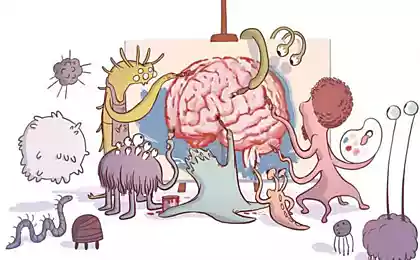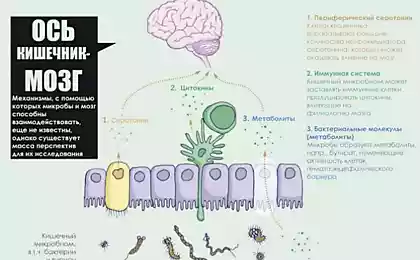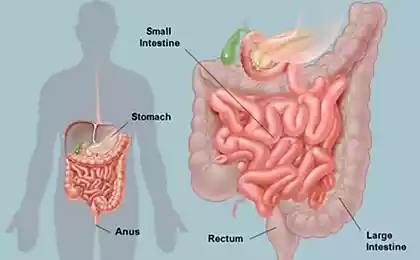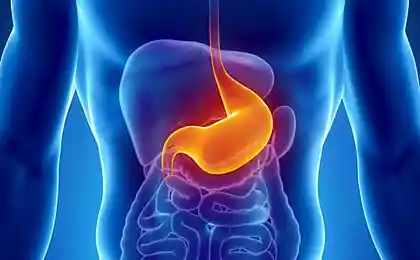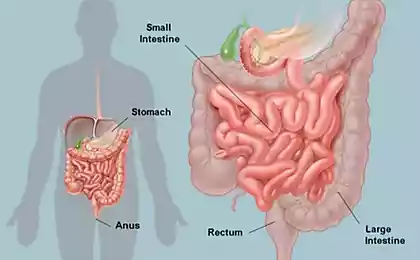657
Why intestinal microflora? 5 Things to Know
In addition to the crucial role in the digestive system, the normal functioning of the intestine largely determines the vitality of the whole body! What's more - there is a close relationship between the gut, immune and nervous systems. The microflora - a separate world, with more than 10,000 species of bacteria, which together weigh about 3-4 kg. The more research is done in this field, the more obvious it becomes that the sphere of activity of these bacteria is much broader than is commonly believed.
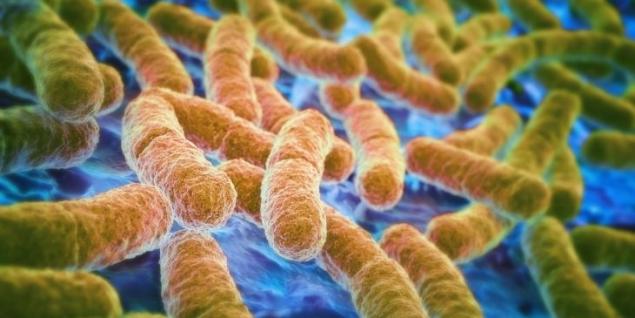
Website Publishing publishes the article "School of Life", which tells the most important facts about the microflora that are necessary to know each person.
1. Protection infektsiyUchёnye found that 80% of immune cells are concentrated in the gut, and the immune system - the body's main weapon in the fight against pathogens. Beneficial bacteria form a kind of barrier between the alien microbes and the intestinal wall, inhibiting pathogenic intestinal microflora, directly or activating the immune mechanisms. Our microflora trains called T-cells, are responsible for the body's immune system as a whole. That T-cells control the strength and duration of the immune response.
2. The absorption of vitamins, minerals and nutrients veschestvBakterialnye cells microflora help the body get rid of the "bad" bacteria. Normal intestinal microflora significantly reduces the likelihood that pathogenic microbes take root and begin to multiply. However, in case of violation of the intestinal microflora, the body is unable to properly digest food, and thus violated the process of absorption of minerals, vitamins and nutrients. This can lead to serious diseases in the future.
3. MetabolizmMetabolizm or metabolism in human organism is regulated largely by the digestive system. Numerous studies have shown that violation of intestinal microflora has a direct impact on weight gain. If the extra kilos appear for no apparent reason, be sure to refer to the gastroenterologist and to pass all the necessary tests. Excess weight can be a consequence of dysbiosis and metabolic disorders.
4. DepressiyaSfera bacterial activity is not limited to the intestine. < The microflora also affects the mental state of a person and a violation of its composition associated with the occurrence of depression. It is remarkable that intestinal bacteria affect not only our mood, but also in the brain. An important role in this process is played by the specific substances produced by intestinal microflora, which interact with the brain through the vagus nerve and the endocrine system.
Studies have demonstrated that intestinal bacteria regulate serotonin levels, the so-called "The hormone of happiness." Thus, to date, proved the dependence of mental health on the quality of the intestinal microflora. This means that changes in the microflora caused by, for example, antibiotics, diet or infection may have severe implications for brain function.
5. Chronic ustalostPrichinoy low energy and chronic fatigue can be intestinal intoxication. When disturbed the balance of beneficial microorganisms, they lose the ability to fight pathogens, which produce toxic products. Daily poisoning of the body's own poisons leads to chronic fatigue, decreased performance and reduced vitality and tone the entire body.
How to ensure a healthy intestinal flora? First of all, for the normal functioning of the intestines is crucial a healthy lifestyle. A proper diet, moderate exercise, the stabilization of the regime of rest and sleep - all this is a prerequisite for good health and the health of the organism microflora. It should also include in your diet more than fermented milk products, rich beneficial bacteria. Also, to help our body established probiotics, which are composed of live beneficial bacteria - the same as the natural inhabitants of our intestines
. via shkolazhizni.ru/health/articles/76578/

Website Publishing publishes the article "School of Life", which tells the most important facts about the microflora that are necessary to know each person.
1. Protection infektsiyUchёnye found that 80% of immune cells are concentrated in the gut, and the immune system - the body's main weapon in the fight against pathogens. Beneficial bacteria form a kind of barrier between the alien microbes and the intestinal wall, inhibiting pathogenic intestinal microflora, directly or activating the immune mechanisms. Our microflora trains called T-cells, are responsible for the body's immune system as a whole. That T-cells control the strength and duration of the immune response.
2. The absorption of vitamins, minerals and nutrients veschestvBakterialnye cells microflora help the body get rid of the "bad" bacteria. Normal intestinal microflora significantly reduces the likelihood that pathogenic microbes take root and begin to multiply. However, in case of violation of the intestinal microflora, the body is unable to properly digest food, and thus violated the process of absorption of minerals, vitamins and nutrients. This can lead to serious diseases in the future.
3. MetabolizmMetabolizm or metabolism in human organism is regulated largely by the digestive system. Numerous studies have shown that violation of intestinal microflora has a direct impact on weight gain. If the extra kilos appear for no apparent reason, be sure to refer to the gastroenterologist and to pass all the necessary tests. Excess weight can be a consequence of dysbiosis and metabolic disorders.
4. DepressiyaSfera bacterial activity is not limited to the intestine. < The microflora also affects the mental state of a person and a violation of its composition associated with the occurrence of depression. It is remarkable that intestinal bacteria affect not only our mood, but also in the brain. An important role in this process is played by the specific substances produced by intestinal microflora, which interact with the brain through the vagus nerve and the endocrine system.
Studies have demonstrated that intestinal bacteria regulate serotonin levels, the so-called "The hormone of happiness." Thus, to date, proved the dependence of mental health on the quality of the intestinal microflora. This means that changes in the microflora caused by, for example, antibiotics, diet or infection may have severe implications for brain function.
5. Chronic ustalostPrichinoy low energy and chronic fatigue can be intestinal intoxication. When disturbed the balance of beneficial microorganisms, they lose the ability to fight pathogens, which produce toxic products. Daily poisoning of the body's own poisons leads to chronic fatigue, decreased performance and reduced vitality and tone the entire body.
How to ensure a healthy intestinal flora? First of all, for the normal functioning of the intestines is crucial a healthy lifestyle. A proper diet, moderate exercise, the stabilization of the regime of rest and sleep - all this is a prerequisite for good health and the health of the organism microflora. It should also include in your diet more than fermented milk products, rich beneficial bacteria. Also, to help our body established probiotics, which are composed of live beneficial bacteria - the same as the natural inhabitants of our intestines
. via shkolazhizni.ru/health/articles/76578/
15 babies born with a surprisingly luxurious hairstyles
This beautiful swan embraced man in gratitude for saving
